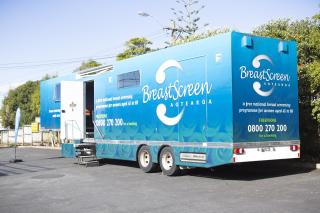- Home
- News
- Screening Matters, Issue 60, December 2017
- Sharing data to improve BreastScreen Aotearoa participation and attendance
News
- Screening Matters Newsletter
- April 2019
- April 2018
- December 2017
- August 2017
- April 2017
- December 2016
- October 2016
- March 2016
- November 2015
- August 2015
- June 2015
- April 2015
- February 2015
- December 2014
- October 2014
- August 2014
- June 2014
- April 2014
- February 2014
- December 2013
- October 2013
- August 2013
- June 2013
- April 2013
- February 2013
Screening Matters
The National Screening Unit newsletter
In this issue:
- Benefits of the Universal Newborn Hearing Screening and Early Intervention Programme (UNHSEIP)
- Severe combined immune deficiency disorder now included in newborn screening
- Positive start to bowel screening in Hutt Valley and Wairarapa
- Sharing data to improve BreastScreen Aotearoa participation and attendance
- Profile of Mana Wāhine Day in Lower Hutt
Sharing data to improve BreastScreen Aotearoa participation and attendance

Hawke's Bay District Health Board's Mother’s Day campaign
This year, the Hawke’s Bay District Health Board Population Screening Team identified and contacted the health centres in Napier and Hastings with high Māori and Pacific enrolment numbers.
The health centres supported by Health Hawke’s Bay (PHO) were asked to provide a list of their registered and enrolled Māori and Pacific women aged 45–69 years to BreastScreen Coast to Coast (BSCC) for data matching.
This identified women who were not enrolled in the BreastScreen Aotearoa programme and those who hadn’t had a mammogram for more than five years.
Once the data was matched, the health centres gave consent for the information to be released directly to the population screening team.
The team sent out letters inviting the women to have a mammogram by the end of July. They were also offered assistance to attend their appointment from support to services providers, and a $20 Pak ’n Save gift card to acknowledge the effort required to attend their mammogram.
Important learnings when it came to matching the data were to:
- identify women who have been treated for breast cancer and are in the care of a specialist, and/ or women who don’t require a mammogram, to ensure they are not contacted
- complete another cross-check of the lists against the national episodes in NHI to identify women whose breast cancer was not originally detected through a BreastScreen Aotearoa mammogram.
The campaign was extended to the end of September due to the demand for appointments. By the end of the campaign, 119 Māori and Pacific women attended their mammogram in response to the letters sent to them. BSCC later followed up with the women who did not respond the first time and offered them another opportunity to attend. TRG, the fixed site for mammograms, supported this campaign by prioritising appointments for Māori and Pacific women.
Attendance at BreastScreen mobile units
Using learnings from previous BSA mobile visits to Hawke’s Bay, BSCC has worked to improve attendance at the mobile unit.
During the mobile unit visit to Flaxmere last year, the Population Screening Team had two support staff working closely with the BSA team, trying to locate Hawke’s Bay Māori and Pacific women who had not attended their appointments at the mobile. The kaimahi, Berry Rangi and Margaret Alexander, found that many women who had not attended had either not received their appointment letter or no longer lived at the current address. In some cases, they hadn’t done so for quite some time.
BSCC looked into ways to improve and update contact details to ensure women receive their appointment letter. A new process was trialled whereby all Māori and Pacific women who were sent an appointment for a mammogram at the mobile unit and who hadn’t confirmed their appointments were referred to the Hawke’s Bay District Health Board (HBDHB) Population Screening Team. Addresses and details were then cross-checked against the HBDHB patient management system. Once this information was updated with new details, including mobile numbers and so on, the women were referred to the relevant Independent Service Provider for follow up.
This new process was trailed first in Wairoa, in March and April this year. BSCC sent the data of 132 Māori and Pacific women who had not confirmed their visit. All of these women were data matched against the patient management system and then referred on to Kahungunu Executive. Their staff followed up with these women and let BSCC know the outcome, such as if the women had moved address, were unable to be located, or if staff were supporting women to attend. This mobile visit to Wairoa was very successful, with a reduction in the ‘did not attend’ rate to 7%.
To receive the Screening Matters newsletter by email, fill out our sign-up form.

